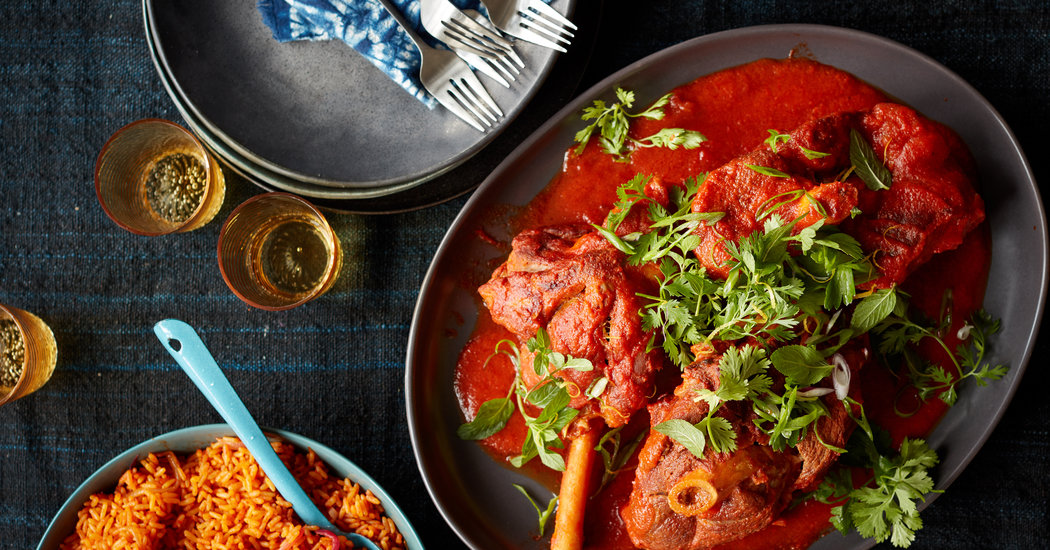
Good morning. We sailed a terrific print edition of The New York Times onto front steps and newsstand shelves this morning, with the Food section dominated by a beautiful essay and set of recipes by Yewande Komolafe that are meant to serve as an introduction to some of the essential dishes of Nigeria, the country in which Yewande was raised and still feels called by, after two decades in the United States.
So here is fish pepper soup and jollof rice, beef suya and braised goat in obe ata (above), the Nigerian mother sauce of puréed red bell peppers, onions, tomato and habanero.
Here, also, are Yewande’s recipes for efo riro, the stewed amaranth greens common to Yoruba kitchens across the Nigerian southwest, and for dodo, the fried sweet plantains that temper the heat of fiery main dishes.
She tells the story of frejon, as well, a silky pudding of beans and coconut that is a dish of the port city of Lagos, a reflection of the cooking of those Africans repatriated there after the abolition of slavery in Brazil. And of crisp and starchy yam fries and Agege bread, dense and white.
Of course there’s dessert, too: puff puff, a kind of Nigerian doughnut hole, nutmeg-spiked and tossed in spiced sugar. I hope — we all do here — that you will cook from Yewande’s words for years to come.
There are many more recipes waiting for you on NYT Cooking. Creamy polenta with mushrooms, for instance. Slow-roasted salmon with citrus and an herb salad. Pasta with seared zucchini and ricotta salata.
Yes, you need a subscription to access them. I hope, if you haven’t taken one out already, that you will buy one today. It’s subscriptions that allow us to do the work that we do, work that we’d like to keep doing, work that we think helps readers understand the world. You can even get someone a gift subscription to NYT Cooking, if you like.
Do visit us for free on Instagram, Twitter, Facebook and YouTube, where we’re cooking up all kinds of interesting, er, content. And if you run into trouble with a recipe or with the site or apps, just ask for help: cookingcare@nytimes.com. We will get back to you.
Now, it doesn’t have anything to do with sauce pans or Mason jars, but gee willikers why’d it take me so long to catch up with the second season of “Fleabag” on Amazon? Maybe you’ve already binged it. Absolutely read Parul Sehgal on the subject of the show, then, and think long thoughts.
ProPublica just unveiled its latest, an investigation into the 2016 capture of 10 Navy sailors by Iran’s Islamic Revolutionary Guard Corps. It is of a piece with the rest of ProPublica’s Navy reporting, showing “inadequate training, poor leadership, and a disinclination to heed the warnings of its men and women about the true extent of its vulnerabilities.”
In 2011, Barry Estabrook sounded the alarm in The Atlantic about the indentured servitude of farm workers in Immokalee, Fla., laboring in terrible conditions to bring Americans fresh tomatoes. Now Tobias Jones and Ayo Awokoya of The Guardian have performed a similar expose on the Italian tomato crop, farmed by migrant workers who are all but enslaved by the mafia that keeps the fields far from the rule of law.
Finally, from The Times Magazine, here’s David Marchese’s interview with Trey Anastasio. And here’s Anastasio with Phish, “Johnny B. Goode,” Denver, Nov. 17, 1997. See you on Friday.




